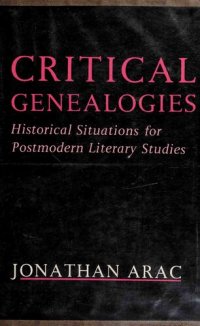
Ebook: Critical genealogies: historical situations for postmodern literary studies
Author: Jonathan Arac
- Genre: Literature
- Series: The Social Foundations of Aesthetic Forms
- Year: 1987
- Publisher: Columbia University Press
- City: New York
- Language: English
- pdf
Reassessing the ancestry of contemporary criticism, Jonathan Arac opens current debates over English studies to a larger understanding of cultural and political history, from romanticism through postmodernism. This work of creative scholarship enlarges our knowledge of the history of criticism while also exemplifying a new practice of writing literary history. Arac draws new lines from Wordsworth, Coleridge, Shelley, and Arnold to their modern successors (such as F. O. Matthiessen, M. H. Abrams, Frank Kermode, and Harold Bloom) and to recent developments in Marxism and poststructuralism. He reaches beyond the limits of “theory” to develop important critical analyses of The Prelude, “The Rime of the Ancient Mariner,” The Wings of the Dove, Nostromo, and Women in Love.
Arac reaches some startling and provocative conclusions. He argues that modern literary studies have been constituted through the interaction of several recurrences: a return to Coleridgean theory, a return to Arnoldian stances, and a continuing devotion to modern disciplinary techniques. The knot that binds these together is the political trauma of the 1930s, which marked all who lived through it—from New Critics to New York intellectuals—and which still casts its shadows. Bringing this trauma to articulation is a recovery of the past that helps us recover from it.
This study’s "genealogical" method, associated with Nietzsche and Foucault, correlates a remarkably wide range of materials while rejecting the chimerical goal of total synthesis. In excavating the past, it aims to account for and conceive alternatives to our present condition. Arac builds on the work of Walter Benjamin, a utopian who emphasized the power of criticism for making a future, but also a materialist who emphasized the power of criticism to produce what counts as relevant from the past. Even Benjamin, however, undergoes a penetrating critique, through Arac’s innovative comparison of Emily Dickinson with Charles Baudelaire, the subject of Benjamin’s major late work.
Arac reaches some startling and provocative conclusions. He argues that modern literary studies have been constituted through the interaction of several recurrences: a return to Coleridgean theory, a return to Arnoldian stances, and a continuing devotion to modern disciplinary techniques. The knot that binds these together is the political trauma of the 1930s, which marked all who lived through it—from New Critics to New York intellectuals—and which still casts its shadows. Bringing this trauma to articulation is a recovery of the past that helps us recover from it.
This study’s "genealogical" method, associated with Nietzsche and Foucault, correlates a remarkably wide range of materials while rejecting the chimerical goal of total synthesis. In excavating the past, it aims to account for and conceive alternatives to our present condition. Arac builds on the work of Walter Benjamin, a utopian who emphasized the power of criticism for making a future, but also a materialist who emphasized the power of criticism to produce what counts as relevant from the past. Even Benjamin, however, undergoes a penetrating critique, through Arac’s innovative comparison of Emily Dickinson with Charles Baudelaire, the subject of Benjamin’s major late work.
Download the book Critical genealogies: historical situations for postmodern literary studies for free or read online
Continue reading on any device:

Last viewed books
Related books
{related-news}
Comments (0)